| |
|
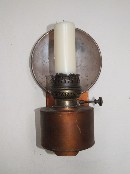 |
|
Borderlands are strange
places. Suffolk merges into
Cambridgeshire smoothly enough, but it is
separated from Norfolk and Essex by great
rivers and water meadows. Few villages
straddle the rivers, and there is usually
a real sense of change from one county to
the other, especially on the southern
border. But up here as well
there is a sense of being in a shadowy,
in-between place, especially out by the
old airbase. Nearby Knettishall
church was derelict half a century ago,
and has now been converted into a private
house. The former base is a bleak place,
but Coney Weston is a pleasant village,
lining its southern side, and separated
from it by woods - indeed this area has
more than its fair share of trees. Some
distance outside of its village, St Mary
is almost hidden from the road by them,
and comes as a surprise to the passer-by.
|
The
setting is delicious, with the rising fields on
all sides, and a copse of trees surrounding the
church. The tower fell two centuries ago, and the
west end now has a tall chimney rising in the
corner. With the thatched roof, filled in windows
and the patchy flintwork, it looks like a cottage
in a Brothers Grimm fairytale.
This
little church is open to pilgrims and strangers
every day, and deserves all the visitors it can
get. The interior is as charming as the outside,
and underwent one of those low key and entirely
rustic restorations of the 19th century that seem
to have been influenced by the Rector. There was
no money for stained glass windows, but the
Rector's daughter produced some delightful
paintings of angels inside the pair of medieval
image niches to the south of the chancel arch.
The niches on the other side contain the
comandments.
| Best of all, and from about
half a century later I shoud think, is
the altar. It would not be out of place
in an anglo-Catholic shrine like Kettlebaston.
The panels are painted with ten Saints,
two at each end and six on the front.
They are, from the north, St Edmund, St
Peter, St Barbara, the Blessed Virgin, St
Bartholomew, St John, St Margaret, St
Helen, St Swithin and St Apollonia. This
last-named Saint has always been one of
my favourites. She holds a tooth in
pincers; in some stories, this was the
instrument of her martyrdom, while others
have it that she pulled out all her own
teeth in an attempt to efface her beauty
and remain a virgin.
|
|
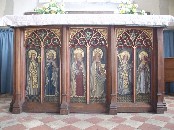 |
Whatever,
she was that most vital of Saints in the medieval
economy of grace, the guardian to whom
intercessions might be made by sufferers of
toothache.
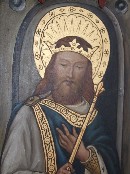 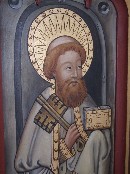 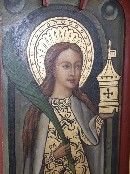 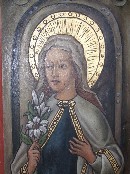
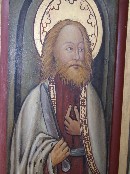
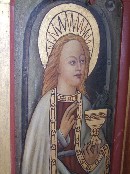 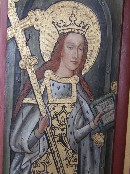 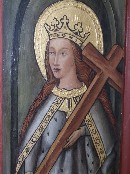 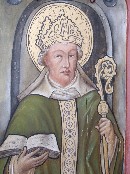 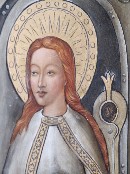
The
High Church altar is a curious counterpoint to
the low church tin plate lettering behind it. The
chancel itself retains evidence of its 14th
century grandeur, with the springing of a great
image niche, with some of its original colouring,
and a beautiful piscina with two openings.
| Roughly contemporary with
the chancel must be the traceried font,
and, on the north wall of the nave, the
fragments of surviving wall paintings.
There appears to be some intention of
exposing and preserving these. On top of
the familiar ochre of medieval paint
there is the gothic lettering of the
comforting words put over them by the
Elizabethans. The
organ at the west end is by Father
Willis, its narrow height matching that
of the nave. All in all, this church is a
delight, a rustic, devotional space that
would be instantly recognisable to the
19th century blacksmith and ploughboy who
once worshipped here.
|
|
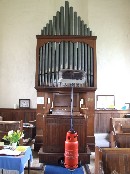 |
|
|
|

